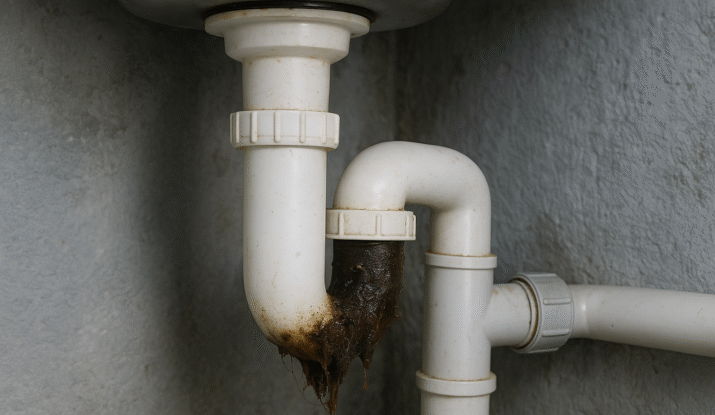Are you tired of standing water in your shower, sinks that drain at a snail’s pace, or that foul smell wafting from your kitchen drain? Clogged drains are more than just an annoyance; they can disrupt your daily routine and, if left unaddressed, lead to bigger, more expensive plumbing problems down the line.
At Pipe & Drain Cleaners, we’ve seen it all – from minor hair clogs to stubborn grease blockages. While we’re always here to provide expert drain cleaning services, we believe that prevention is key to a happy, healthy home. This ultimate guide will equip you with the knowledge and simple tips you need to prevent clogged drains and keep your plumbing flowing freely.
The Usual Suspects: What Causes Most Drain Clogs?
Understanding what goes down your drains is the first step in preventing blockages. Here are the most common culprits:
Hair: Especially in bathroom sinks and showers, hair is a major offender. It clumps together, trapping soap scum and other debris, forming tough blockages.
Grease and Fats: Pouring cooking grease down the kitchen sink is a huge no-no. As it cools, grease solidifies and sticks to the inside of your pipes, accumulating over time and narrowing the drain’s opening.
Food Scraps: Even with a garbage disposal, small food particles like coffee grounds, rice, pasta, and fruit peels can collect and create sludge in your kitchen drains.
Soap Scum: The residue from bar soaps can build up on pipe walls, acting like a magnet for hair and other debris.
“Flushable” Wipes & Hygiene Products: Despite what the packaging says, most “flushable” wipes don’t break down like toilet paper and are a leading cause of sewer line clogs. Cotton balls, feminine hygiene products, and dental floss also belong in the trash.
Foreign Objects: Toys, jewelry, cotton swabs, and other non-dissolvable items accidentally (or intentionally) flushed can cause immediate and severe blockages.
Tree Roots: While less common for everyday household drains, tree roots seeking water sources can infiltrate outdoor sewer lines through tiny cracks, growing and creating massive blockages. This usually requires professional intervention.
Your DIY Arsenal: Simple Tips for Drain Clog Prevention
You don’t need to be a plumbing expert to significantly reduce your risk of clogs. Incorporate these easy habits into your routine:
- Use Drain Screens/Hair Catchers: This is your first line of defense! Place inexpensive screens over all your bathroom drains (sinks and showers) to catch hair and larger debris before it enters your pipes. Empty them regularly.
- Proper Grease Disposal: NEVER pour grease, fats, or oils down your sink. Instead, pour them into an old can or jar, let them cool and solidify, then scrape them into the trash. Wipe greasy pans with a paper towel before washing.
- Mind Your Food Scraps: Scrape all food scraps into the trash before rinsing plates. Even if you have a garbage disposal, avoid putting fibrous or starchy items like potato peels, banana peels, coffee grounds, eggshells, or large quantities of anything down it.
- Regular Hot Water Flush: Once a week, after using your sink, let the hot water run for a few minutes. This can help break down minor grease buildup and flush away small particles. For kitchen sinks, some suggest following with a cup of baking soda and then a cup of white vinegar (let it sit for 30 minutes, then flush with hot water) for a natural degreaser, but avoid this if you suspect a serious blockage.
- Clean Sink Stoppers: Pull out your sink stoppers and clean them regularly. Hair and grime often accumulate around them, contributing to slow drains.
- Avoid Chemical Drain Cleaners: While seemingly quick fixes, these harsh chemicals can be highly corrosive. They often don’t fully clear the blockage and can damage your pipes over time, leading to leaks or even burst pipes. They also pose a risk to your health and the environment.
When to Call the Pros: Recognizing Serious Drain Issues
Even with the best preventative measures, some clogs are inevitable or indicate a deeper problem. Don’t hesitate to contact Pipe & Drain Cleaners if you notice any of the following signs:
Persistent Slow Drains: If multiple drains in your home are draining slowly, it could indicate a main line blockage.
Multiple Clogged Fixtures: When your toilet, shower, and sink are all backing up, it’s a strong sign of a serious blockage in your main sewer line.
Foul Odors: Persistent, unpleasant smells coming from drains can signal a buildup of decaying matter or even sewer gas issues.
Gurgling Sounds: Strange gurgling noises from toilets or drains when water is running elsewhere often mean trapped air due to a blockage.
Water Backups: The most obvious sign of a severe clog is water backing up into sinks, tubs, or toilets, especially after flushing or using another fixture.
Trust Pipe & Drain Cleaners for Clear, Healthy Pipes
At Pipe & Drain Cleaners, we’re experts in diagnosing and resolving all types of drain issues, big or small. From stubborn kitchen clogs to complex sewer line problems, our skilled technicians use advanced tools like hydro-jetting and video camera inspections to ensure your pipes are thoroughly cleaned and any underlying issues are identified.
Don’t let clogs ruin your day or lead to costly damage. While prevention is powerful, professional help is invaluable for tackling serious blockages and maintaining the longevity of your plumbing system.
Is your drain giving you trouble despite your best efforts? Don’t wait for a flood! Contact Pipe & Drain Cleaners today for reliable, efficient, and professional drain cleaning services. Call us at 08004 700 946

